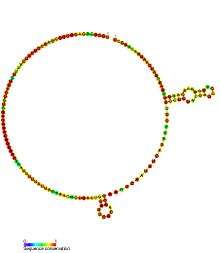CDKN2BAS
CDKN2B-AS, also known as ANRIL (antisense non-coding RNA in the INK4 locus) is a long non-coding RNA consisting of 19 exons, spanning 126.3kb in the genome, and its spliced product is a 3834bp RNA. It is located within the p15/CDKN2B-p16/CDKN2A-p14/ARF gene cluster, in the antisense direction. Single nucleotide polymorphisms (SNPs) which alter the expression of CDKN2B-AS are associated with many diseases, including coronary artery disease, diabetes and many cancers.[3] It binds to chromobox 7 (CBX7) within the polycomb repressive complex 1 and to SUZ12, a component of polycomb repression complex 2 and through these interactions is involved in transcriptional repression.[4][5]
See also
References
- ↑ "Diseases that are genetically associated with CDKN2B-AS1 view/edit references on wikidata".
- ↑ "Human PubMed Reference:".
- ↑ Cunnington MS, Santibanez Koref M, Mayosi BM, Burn J, Keavney B (2010). Gibson G, ed. "Chromosome 9p21 SNPs Associated with Multiple Disease Phenotypes Correlate with ANRIL Expression". PLoS Genet. 6 (4): e1000899. doi:10.1371/journal.pgen.1000899. PMC 2851566
 . PMID 20386740.
. PMID 20386740. - ↑ Yap KL, Li S, Muñoz-Cabello AM, et al. (June 2010). "Molecular interplay of the noncoding RNA ANRIL and methylated histone H3 lysine 27 by polycomb CBX7 in transcriptional silencing of INK4a". Mol. Cell. 38 (5): 662–74. doi:10.1016/j.molcel.2010.03.021. PMC 2886305
 . PMID 20541999.
. PMID 20541999. - ↑ Kotake Y, Nakagawa T, Kitagawa K, et al. (December 2010). "Long non-coding RNA ANRIL is required for the PRC2 recruitment to and silencing of p15(INK4B) tumor suppressor gene". Oncogene. 30 (16): 1956–1962. doi:10.1038/onc.2010.568. PMC 3230933
 . PMID 21151178.
. PMID 21151178.
Further reading
- Mußotter, T; Kluwe, L; Högel, J; Nguyen, R; Cooper, DN; Mautner, VF; Kehrer-Sawatzki, H (Oct 26, 2012). "Non-coding RNA ANRIL and the number of plexiform neurofibromas in patients with NF1 microdeletions.". BMC medical genetics. 13: 98. doi:10.1186/1471-2350-13-98. PMC 3500256
 . PMID 23101500.
. PMID 23101500.
- McPherson R, Pertsemlidis A, Kavaslar N, et al. (2007). "A common allele on chromosome 9 associated with coronary heart disease". Science. 316 (5830): 1488–91. doi:10.1126/science.1142447. PMC 2711874
 . PMID 17478681.
. PMID 17478681.
- Folkersen L, Kyriakou T, Goel A, et al. (2009). Reitsma PH, ed. "Relationship between CAD risk genotype in the chromosome 9p21 locus and gene expression. Identification of eight new ANRIL splice variants". PLoS ONE. 4 (11): e7677. doi:10.1371/journal.pone.0007677. PMC 2765615
 . PMID 19888323.
. PMID 19888323.
- Uno S, Zembutsu H, Hirasawa A, et al. (2010). "A genome-wide association study identifies genetic variants in the CDKN2BAS locus associated with endometriosis in Japanese". Nat. Genet. 42 (8): 707–10. doi:10.1038/ng.612. PMID 20601957.
- Wrensch M, Jenkins RB, Chang JS, et al. (2009). "Variants in the CDKN2B and RTEL1 regions are associated with high-grade glioma susceptibility". Nat. Genet. 41 (8): 905–8. doi:10.1038/ng.408. PMC 2923561
 . PMID 19578366.
. PMID 19578366.
- Gretarsdottir S, Baas AF, Thorleifsson G, et al. (2010). "Genome-wide association study identifies a sequence variant within the DAB2IP gene conferring susceptibility to abdominal aortic aneurysm". Nat. Genet. 42 (8): 692–7. doi:10.1038/ng.622. PMID 20622881.
- Bilguvar K, Yasuno K, Niemelä M, et al. (2008). "Susceptibility loci for intracranial aneurysm in European and Japanese populations". Nat. Genet. 40 (12): 1472–7. doi:10.1038/ng.240. PMC 2682433
 . PMID 18997786.
. PMID 18997786.
- Sato K, Nakagawa H, Tajima A, et al. (2010). "ANRIL is implicated in the regulation of nucleus and potential transcriptional target of E2F1". Oncol. Rep. 24 (3): 701–7. doi:10.3892/or_00000910. PMID 20664976.
- Yasuno K, Bilguvar K, Bijlenga P, et al. (2010). "Genome-wide association study of intracranial aneurysm identifies three new risk loci". Nat. Genet. 42 (5): 420–5. doi:10.1038/ng.563. PMC 2861730
 . PMID 20364137.
. PMID 20364137.
- Broadbent HM, Peden JF, Lorkowski S, et al. (2008). "Susceptibility to coronary artery disease and diabetes is encoded by distinct, tightly linked SNPs in the ANRIL locus on chromosome 9p". Hum. Mol. Genet. 17 (6): 806–14. doi:10.1093/hmg/ddm352. PMID 18048406.
- Hashikata H, Liu W, Inoue K, et al. (2010). "Confirmation of an association of single-nucleotide polymorphism rs1333040 on 9p21 with familial and sporadic intracranial aneurysms in Japanese patients". Stroke. 41 (6): 1138–44. doi:10.1161/STROKEAHA.109.576694. PMID 20395613.
- Helgadottir A, Thorleifsson G, Manolescu A, et al. (2007). "A common variant on chromosome 9p21 affects the risk of myocardial infarction". Science. 316 (5830): 1491–3. doi:10.1126/science.1142842. PMID 17478679.
- Yang XR, Liang X, Pfeiffer RM, et al. (2010). "Associations of 9p21 variants with cutaneous malignant melanoma, nevi, and pigmentation phenotypes in melanoma-prone families with and without CDKN2A mutations". Fam. Cancer. 9 (4): 625–33. doi:10.1007/s10689-010-9356-3. PMC 3233727
 . PMID 20574843.
. PMID 20574843.
- Shete S, Hosking FJ, Robertson LB, et al. (2009). "Genome-wide association study identifies five susceptibility loci for glioma". Nat. Genet. 41 (8): 899–904. doi:10.1038/ng.407. PMID 19578367.
- Kathiresan S, Voight BF, et al. (2009). "Genome-wide association of early-onset myocardial infarction with single nucleotide polymorphisms and copy number variants". Nat. Genet. 41 (3): 334–41. doi:10.1038/ng.327. PMC 2681011
 . PMID 19198609.
. PMID 19198609.
- Bei JX, Li Y, Jia WH, et al. (2010). "A genome-wide association study of nasopharyngeal carcinoma identifies three new susceptibility loci". Nat. Genet. 42 (7): 599–603. doi:10.1038/ng.601. PMID 20512145.
- Turnbull C, Ahmed S, Morrison J, et al. (2010). "Genome-wide association study identifies five new breast cancer susceptibility loci". Nat. Genet. 42 (6): 504–7. doi:10.1038/ng.586. PMID 20453838.
- Schaefer AS, Richter GM, Groessner-Schreiber B, et al. (2009). Marchini J, ed. "Identification of a shared genetic susceptibility locus for coronary heart disease and periodontitis". PLoS Genet. 5 (2): e1000378. doi:10.1371/journal.pgen.1000378. PMC 2632758
 . PMID 19214202.
. PMID 19214202.
External links

 . PMID 20386740.
. PMID 20386740. . PMID 20541999.
. PMID 20541999. . PMID 21151178.
. PMID 21151178. . PMID 23101500.
. PMID 23101500. . PMID 17478681.
. PMID 17478681. . PMID 19888323.
. PMID 19888323. . PMID 19578366.
. PMID 19578366. . PMID 18997786.
. PMID 18997786. . PMID 20364137.
. PMID 20364137. . PMID 20574843.
. PMID 20574843. . PMID 19198609.
. PMID 19198609. . PMID 19214202.
. PMID 19214202.